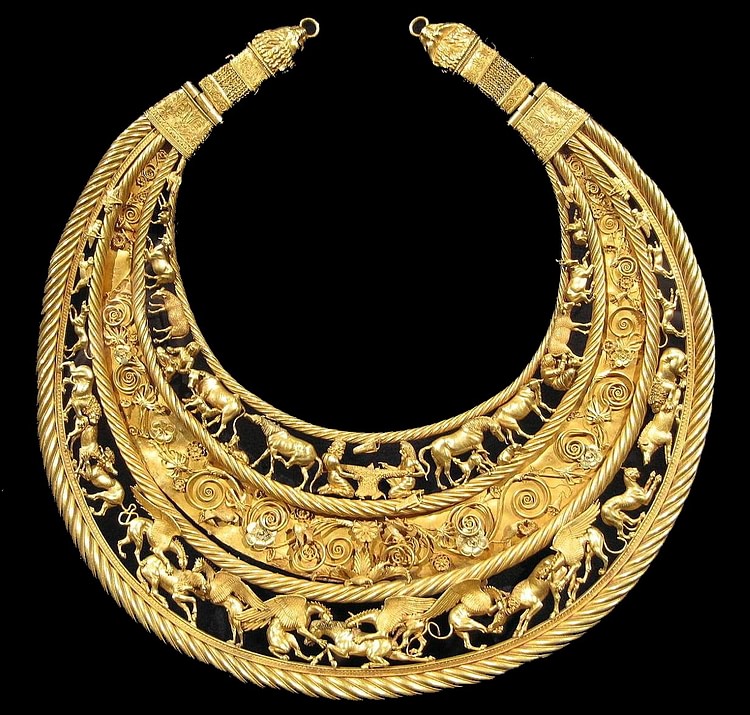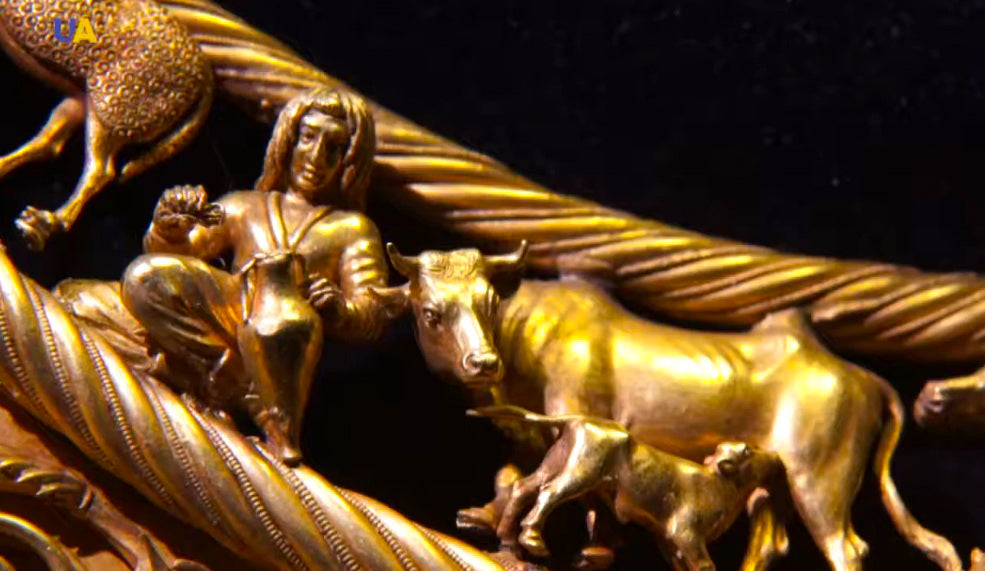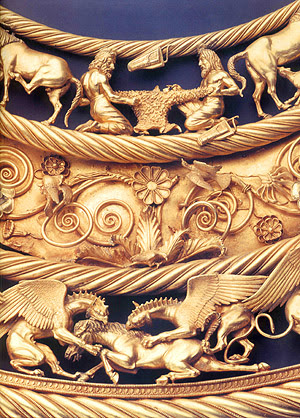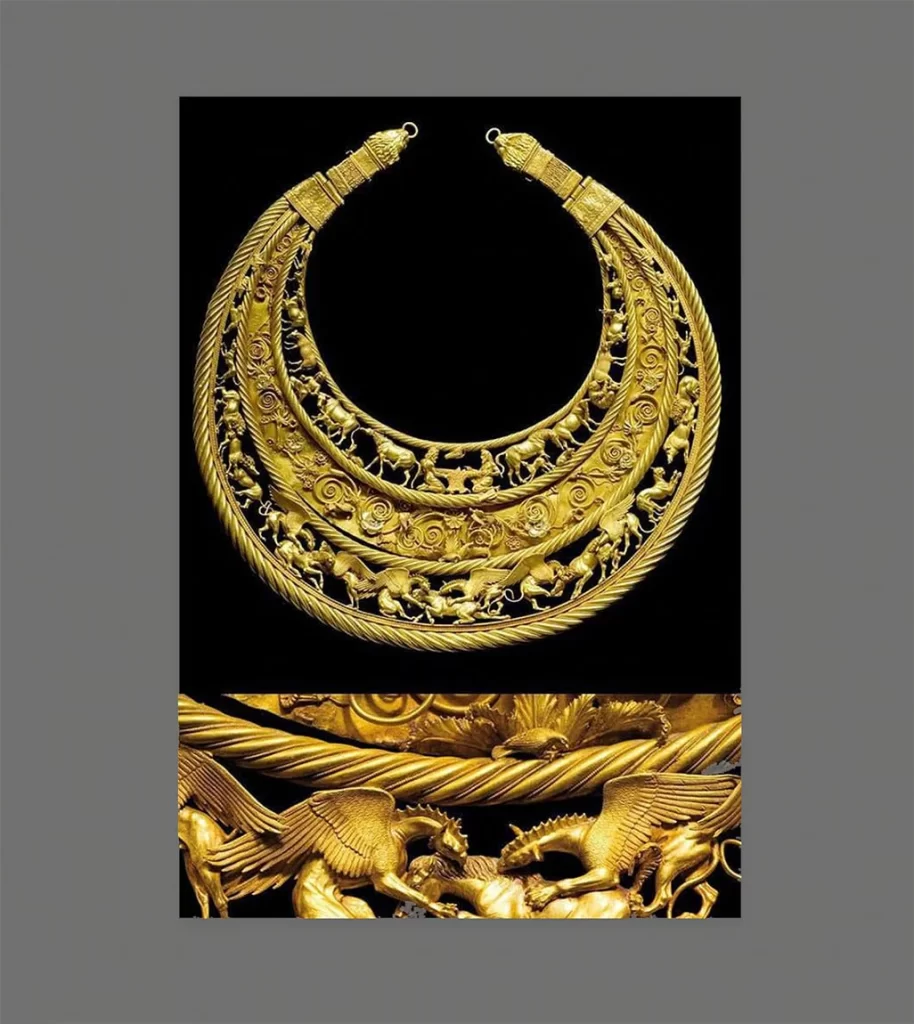The ancient world is filled with remarkable artifacts that continue to captivate historians, archaeologists, and art enthusiasts alike. Among these treasures, the Scythian gold pectoral discovered in the Tovsta Mohyla burial mound stands out as a true masterpiece of ancient craftsmanship. This stunning piece of jewelry, unearthed in 1971 by Ukrainian archaeologist Boris Mozolevski, is considered one of the greatest archaeological finds of the 20th century, and its secrets continue to intrigue experts even today.
In this blog post, we will delve into the fascinating history and remarkable features of the Scythian gold pectoral, exploring the insights it provides into the rich cultural heritage of the Scythian people and the remarkable artistry of the ancient world.
The Scythians: A Powerful Semi-Nomadic Culture
The Scythians were a semi-nomadic Iranian people who flourished in the northern region of the Black Sea, stretching from the Ural Mountains to the Altai Mountains, for nearly a millennium. During this time, they established a vast and powerful empire, engaging in extensive trade and cultural exchange with neighboring civilizations, including the ancient Greeks, Persians, and Chinese.

The Scythians were renowned for their skilled horsemanship, their sophisticated metalworking techniques, and their intricate artistic traditions. Their culture was deeply rooted in their connection to the natural world, and this reverence for the elements is reflected in the symbolism and imagery found throughout their artifacts.
The Discovery of the Tovsta Mohyla Pectoral
The Tovsta Mohyla burial mound, where the pectoral was discovered, is located in southern Ukraine, near the town of Pokrov in the Dnipro region. This ancient site was the final resting place of a Scythian chieftain, and the pectoral was likely commissioned by the chieftain and crafted either by skilled Scythian artisans or by ancient Greek metallurgists based in the nearby Panticapaeum region, which is now part of Crimea.
The pectoral’s discovery in 1971 was a momentous event in the world of archaeology, as it revealed the incredible artistry and craftsmanship of the Scythian people. The sheer size, weight, and intricate details of the pectoral have left experts in awe, and its value is estimated to be in the millions of dollars.
The Remarkable Features of the Scythian Gold Pectoral

The Scythian gold pectoral is a true masterpiece of ancient craftsmanship, measuring 30.6 cm in diameter and weighing over 1150 grams of solid 24-carat gold. The piece is divided into three distinct sections, each reflecting different aspects of Scythian culture and beliefs.
The Upper Section: Everyday Life
The upper section of the pectoral depicts scenes from the daily life of the Scythians, showcasing their skilled horsemanship, their hunting prowess, and their reverence for the natural world. The intricate details of the figures and the dynamic compositions suggest a deep understanding of the Scythian way of life.
The Middle Section: Connection with Nature
The middle section of the pectoral is considered to represent the Scythians’ deep connection with nature. This section features a complex array of individually cast and soldered figures and elements, including animals, mythological creatures, and geometric patterns. The level of detail and craftsmanship in this section is truly breathtaking, highlighting the Scythians’ exceptional metalworking abilities.
The Lower Section: Cosmic Symbolism
The third and final section of the pectoral is believed to represent the Scythians’ beliefs in the cosmos and their mythology. This section features a range of symbolic elements, including celestial motifs and mythological figures, suggesting a deep understanding of the spiritual and metaphysical realms.
The overall composition of the pectoral is a testament to the Scythians’ artistic vision and their ability to seamlessly integrate diverse elements into a cohesive and visually stunning work of art.

The Enduring Mystery of the Scythian Gold Pectoral
Despite the wealth of information that the Scythian gold pectoral has provided about the culture and beliefs of the Scythian people, many mysteries surrounding this remarkable artifact remain. The precise techniques used in its creation, the identity of the Scythian chieftain for whom it was commissioned, and the full meaning of the intricate symbolism depicted on the pectoral continue to elude experts.
Moreover, the pectoral’s journey from its discovery in 1971 to its current location in the National Museum of the History of Ukraine in Kyiv has been fraught with challenges and controversies. The artifact’s ownership and display have been the subject of ongoing debates and legal battles, further adding to the intrigue and mystery surrounding this remarkable piece of ancient art.

Conclusion
The Scythian gold pectoral from Tovsta Mohyla stands as a testament to the remarkable artistic and cultural achievements of the Scythian people. This stunning artifact not only provides a glimpse into the rich tapestry of Scythian life and beliefs but also serves as a reminder of the enduring legacy of ancient civilizations and the ongoing quest to uncover their secrets.
As we continue to study and appreciate the Scythian gold pectoral, we are reminded of the power of art and archaeology to illuminate the past and inspire our understanding of the human experience across the ages. This remarkable piece of ancient craftsmanship serves as a powerful symbol of the enduring spirit of the Scythian people and the timeless beauty of the ancient world.
